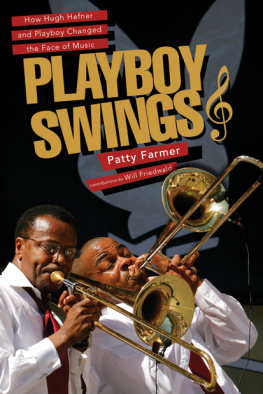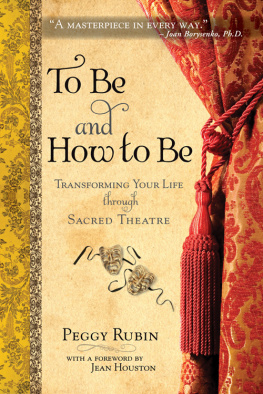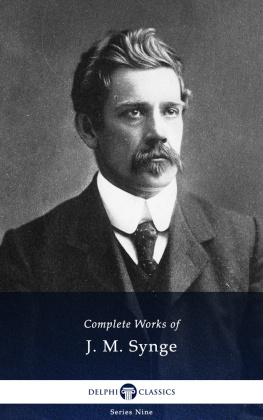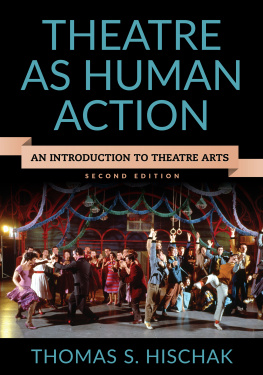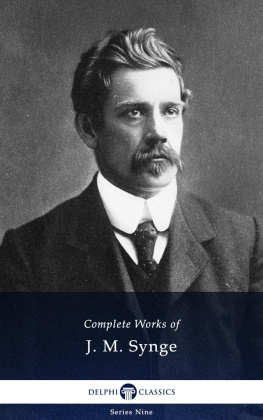J. M. Synges The Playboy of the Western World
Im thinking this night wasnt I a foolish fellow not to kill my father in years gone by.
Christy Mahon
On the first night of J. M. SyngesThe Playboy of the Western World (1907), the audience began protesting in the theatre; by the third night the protests had spilled onto the streets of Dublin. How did one play provoke this?
Christopher Collins addresses The Playboys satirical treatment of illusion and realism in light of Irelands struggle for independence, as well as Synges struggle for artistic expression. By exploring Synges unpublished diaries, drafts and notebooks, he seeks to understand how and why the play came to be.
This volume invites the reader behind the scenes of this inflammatory play and its first performances, to understand how and why Synge risked everything in the name of art.
Christopher Collins is Assistant Professor of Drama at Nottingham University.
The Fourth Wall
The Fourth Wall series is a growing collection of short books on famous plays. Its compact format perfectly suits the kind of fresh, engaging criticism that brings a play to life.
Each book in this series selects one play or musical as its subject and approaches it from an original angle, seeking to shed light on an old favourite or break new ground on a modern classic. These lively, digestible books are a must for anyone looking for new ideas on the major works of modern theatre.
Also available in this series:
Heiner Mllers The Hamletmachine by David Barnett
Lerner and Loewes My Fair Lady by Keith Garebian
Samuel Becketts Krapps Last Tape by Daniel Sack
Thornton Wilders The Skin of Our Teeth by Kyle Gillette
Harold Pinters Party Time by Graham White
Coming soon:
Georg Bchners Woyzeck by Karoline Gritzner
Benjamin Brittens Peter Grimes by Sam Kinchin-Smith
J. M. Barries Peter Pan by Lucie Sutherland
Sondheim and Wheelers Sweeney Todd by Aaron Thomas
Errol Johns Moon on a Rainbow Shawl by Lynnette Goddard
Caryl Churchills Far Away by Dan Rebellato
August Wilsons Joe Turners Come and Gone by Ladrica Menson-Furr
Tim Crouchs An Oak Tree by Catherine Love
Rogers and Hammersteins The Sound of Music by Julian Woolford
J. M. Synges The Playboy of the Western World
Christopher Collins

First published 2016
by Routledge
2 Park Square, Milton Park, Abingdon, Oxon OX14 4RN
and by Routledge
711 Third Avenue, New York, NY 10017
Routledge is an imprint of the Taylor & Francis Group, an informa business
2016 Christopher Collins
The right of Christopher Collins to be identified as author of this work has been asserted by him in accordance with sections 77 and 78 of the Copyright, Designs and Patents Act 1988.
All rights reserved. No part of this book may be reprinted or reproduced or utilised in any form or by any electronic, mechanical or other means, now known or hereafter invented, including photocopying and recording, or in any information storage or retrieval system, without permission in writing from the publishers.
Trademark notice: Product or corporate names may be trademarks or registered trademarks, and are used only for identification and explanation without intent to infringe.
British Library Cataloguing-in-Publication Data
A catalogue record for this book is available from the British Library
Library of Congress Cataloguing-in-Publication Data
A catalog record for this title has been requested
ISBN: 9781138194694 (pbk)
ISBN: 9781315638720 (ebk)
Typeset in Bembo
by Out of House Publishing
For Cline Christine Lehmann, with love.
Contents
I am grateful to the various keepers of manuscripts at the Berg Collection and Foster-Murphy Collection in the New York Public Library and the National Library of Ireland, and, above all, to the keepers of manuscripts at Trinity College, Dublin.
I am thankful to my colleagues and students at the Department of Drama, Trinity College, Dublin, for their invaluable support in helping me think through the research presented in this book, especially Melissa Sihra, Eric Weitz and Brian Singleton.
Thank you to my editors at Routledge, Ben Piggott and Kate Edwards for your continued support.
Thank you to Mary Caulfield; Paul Murphy; Ben Murnane; Justin and Jane MacGregor; Nicholas and Emily Johnson; Professor Anthony Roche; Gabriel Graham; James Hickson; Ann Mulligan and Rhona Greene; Jack Jeffery; Deirdre and John Heath; Eibhlin and Peter Colgan; and Margaret, Michael and Tom Roche for challenging and supporting my thinking on Synges plays and performances. A very special thank to Neasa n Chuanaigh for explaining Synges Hiberno-Irish dialect to me.
Thank you to my family, Lesley and Desmond, William and Hannah Collins for all of your love and support.
My dearest thanks to Cline Christine Lehmann. This book is for you.
Christopher Collins
Southwold
Note: all quotations from manuscript collections, and Synges Collected Works and Collected Letters preserve original spelling.
| CL, Vol. I | J. M. Synge, The Collected Letters of John Millington Synge. Vol. I, 18711907. Ed. Ann Saddlemyer. Oxford: Clarendon Press, 1983. |
| CW, Vol. II | J. M. Synge, Collected Works. Vol. II, Prose. Ed. Alan Price. London: Oxford University Press, 1966. |
| CW, Vol. IV | J. M. Synge, Collected Works. Vol. IV, Plays, Book II. Ed. Ann Saddlemyer. Gerrards Cross: Colin Smythe, 1982. |
| NLI MS | National Library of Ireland Manuscript |
| NYPL MS | New York Public Library Manuscript |
| TCD MS | Manuscripts of the Irish Literary Renaissance: J. M. Synge Manuscripts from the Library of Trinity College Dublin. |
| TCD SSMS | StephensSynge Manuscripts from the Library of Trinity College Dublin. |
John Millington Synge is one the most important and most influential playwrights in modern theatre. Born in 1871 in Dublin, Ireland, Synge had a professional career as a playwright that lasted just seven years before his untimely death at the age of 37. However, his direct influence on subsequent generations of playwrights is quite outstanding: Antonin Artaud, Bertolt Brecht, Federico Garca Lorca, Eugene ONeill, Samuel Beckett, Brian Friel and Marina Carr have all publicly stated how much they are indebted to Synge. The pinnacle of his career as playwright came on 26 January 1907 when he premiered his satirical comedy The Playboy of the Western World at the Abbey Theatre in Dublin. On that infamous evening the audience were absolutely appalled by what they saw and heard, so much so that they began causing disturbances that lasted for an almost an entire week.
This book explores how and why Synge wrote The Playboy of the Western World. The play is first placed in the context of the Ireland of Synges time. The next two chapters offer a textual and thematic analysis of the play and an analysis of its performance history. A key aspect of this book is to explore Synges and his Abbey Theatre colleagues diaries, notebooks and letters so that we can understand their private thoughts on the play and the performance. It is hoped that by consulting the archive a richer, and maybe even an alternative, understanding of the play can be ascertained.
Next page



